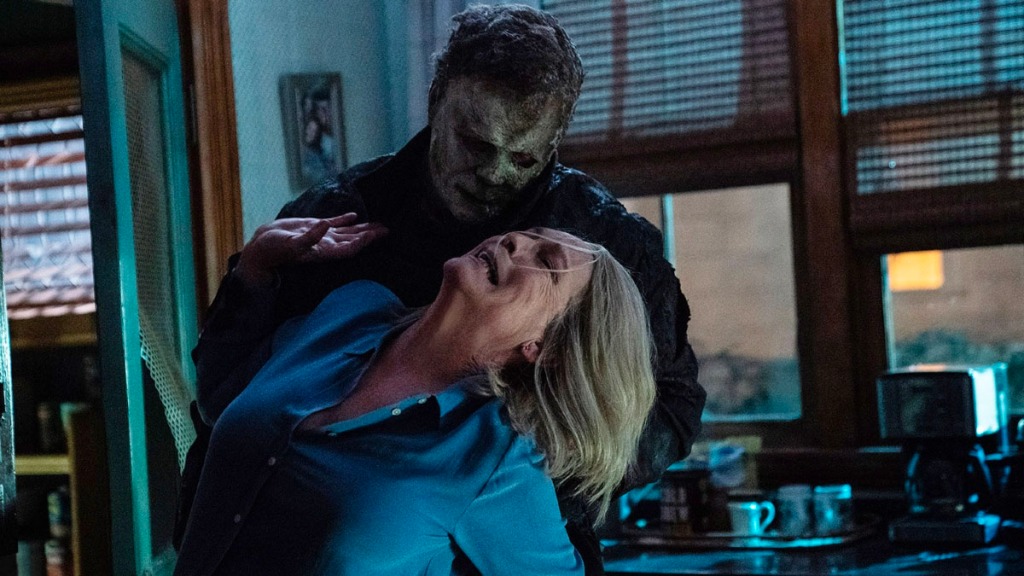The “Halloween” series, which comes to an end this weekend (and if you believe that, I have a set of very rusty kitchen knives I’d like to sell you), has always been the least pretentious of horror franchises. A towering killer in a rubber mask pops out of the shadows to slash one victim after the next. Horror doesn’t get much more basic than that.
But, of course, the “Halloween” series has always had a pretentious side too — the side that began with Donald Pleasance droning on about eee-vil, and the side that has extended, over the latest trilogy, to the top-heavy handwringing of Laurie Strode’s self-actualized guilt and despair. As for Michael Myers, who started out as a small-town killer, he has been turned, more and more explicitly, into A Force Larger Than Himself. And in “Halloween Ends,” that trend now culminates in a movie where Michael, in a certain way, is barely in the movie; he’s the film’s totem, its mascot, its looming emblem of evil. “Halloween Ends” doesn’t finish off the franchise by being the most scary or fun entry in the series. (It should have been both, but it’s neither.) Instead, it’s the most joylessly metaphorical and convoluted entry.
It opens with a promising sequence staged with a certain amused level of Hitchcockian chops. In Haddonfield, on Halloween night of 2019, Corey Cunningham (Rohan Campbell), the film’s central character, is hired as a babysitter for an obnoxious boy named Jeremy. In what appears to be a cruel prank, the child soon vanishes. As Corey searches the house for him, the director, David Gordon Green, ladles on the suspenseful camera angles, and we wait with baited breath for someone — the kid? Michael? — to emerge from the shadows. Instead, what happens is that Jeremy locks Corey in the attic, mocking him from the other side of the door. When Corey busts the door open, he inadvertently knocks Jeremy over the banister of the house’s two-story spiral staircase, just in time for the parents to come home and see their kid plunge to his death.
It’s a freak accident; Corey did nothing wrong. But even though he winds up being acquitted of manslaughter, he still becomes a local pariah, known in Haddonfield as the “psycho babysitter” who killed a child. He will not be the only person in the movie accused of things he didn’t do. You’d think that Laurie Strode (Jamie Lee Curtis), at this point, would be some sort of local heroine, but no. People now hold her responsible for setting off the rampages of Michael Myers.
At first, Rohan Campbell seems a likable actor. He’s appealing in a Roman-lipped young Tom Berenger way, and the fact that he comes on like such a vulnerable geek makes him a sympathetic presence. When his hand gets cut up in an altercation with some teen punks, he winds up at the clinic where Laurie’s live-in granddaughter, Allyson (Andi Matichak), works as a nurse. The two are instantly smitten, which on the movie’s terms makes sense: Corey is an outcast (for unfair reasons), and Allyson wants to heal and protect him, maybe because her grandmother has become an unjust outcast too.
But after one too many run-ins with local bullies, Corey winds up being dragged into a sewer pipe. We can guess who’s doing the dragging. What we can’t guess — or totally figure out, even once it happens — is why Michael Myers (James Jude Courtney), who has been hiding out in that sewer, with rats for company, doesn’t just kill Corey the way he kills everyone else. Instead, the two exchange a long meaningful gaze, and we’re meant to see that in that moment Corey absorbs the spirit of Michael Myers. Michael doesn’t have to kill him. He’s now got something better than another victim — he’s got a disciple! A partner. And maybe, in a certain way, his disciple is the killer in all of us.
Or something or other. David Gordon Green, who has directed all three films of the H40 trilogy, approaches this series with tiny green shoots of “creativity” that turn out to be just the thing to tamp down on the series’ primal entertainment value. His 2018 “Halloween” was a canny piece of slasher nostalgia, because it was as elemental as the original “Halloween” — an old-school movie about hacking people up and hanging them from hooks. But “Halloween Kills” got lost in its soggy stabs at topicality, and “Halloween Ends,” while it has a revenge-of-the-nerd plot and a thematic superstructure that feel a little out of the ordinary, forgets to do the basic work of revving and scaring the audience. Corey-as-the-appropriated-spirit-of-Michael-Myers is a half-interesting, half-baked idea, one that doesn’t exactly inspire terror. He’s simply not threatening the way that Michael is. Who wants a “humanized” killing machine?
As for Laurie, sorry, but I liked her better when she had less metaphysical inner torment. Laurie is writing a book about her experience of fighting the evil that is Michael, and she has to keep reading out lines like “People create their own stories and make their own choices. They believe what they want to believe.” It’s hard not to root for Jamie Lee Curtis, but in this case I was rooting for her to stop being the Joan Didion of slasher battlers.
Laurie and Michael will fight to the death, of course. By now, they complete each other like the Joker and Batman. Yet there’s an inevitability to the final kitchen-utensil showdown that doesn’t do it any favors, and what happens to Michael in the grinding climax is just “final” enough to give you that “Okay, so how will they bring him back next time?” feeling. The truth is that this franchise has been cheating death from the final shot of the 1978 “Halloween” — a moment so outlandishly corrupt in its setting-up-the-sequel opportunism that you can argue it helped set the stage for the new unreality culture. Halloween ends, but the very essence of the “Halloween” series is that it never ends. That’s the real power of Michael Myers. No matter how many times they kill him, he returns with the unholy force of someone with back end deal points.
From Variety US



































